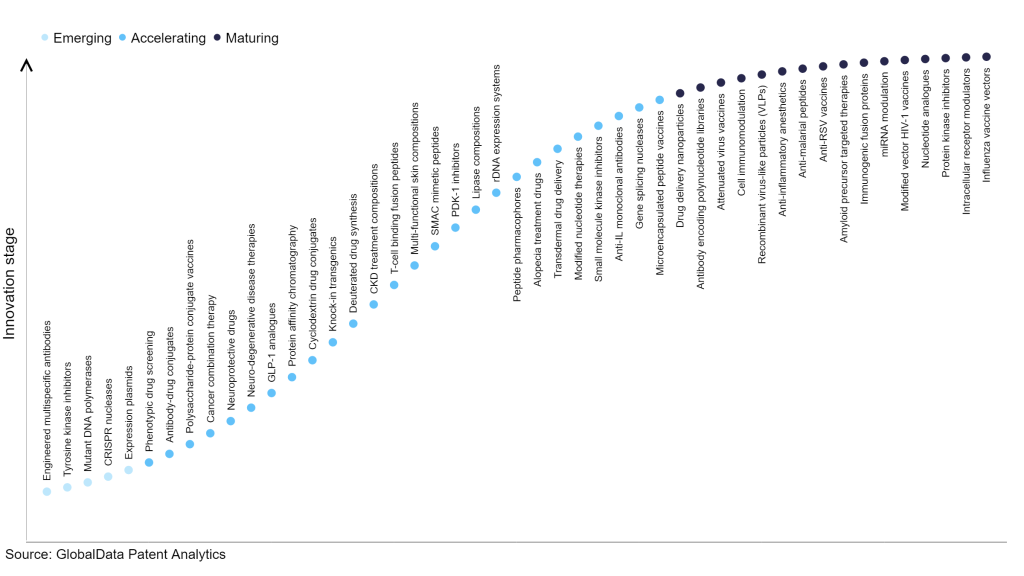The pharmaceutical industry continues to be a hotbed of patent innovation. Activity is driven by the evolution of treatment paradigms, and the gravity of unmet needs, as well as the growing importance of technologies such as pharmacogenomics, digital therapeutics, and artificial intelligence. In the last three years alone, there have been over 136,000 patents filed and granted in the pharmaceutical industry, according to GlobalData’s report on Innovation in pharma: rDNA expression systems. Buy the report here.

Discover B2B Marketing That Performs
Combine business intelligence and editorial excellence to reach engaged professionals across 36 leading media platforms.
However, not all innovations are equal and nor do they follow a constant upward trend. Instead, their evolution takes the form of an S-shaped curve that reflects their typical lifecycle from early emergence to accelerating adoption, before finally stabilizing and reaching maturity.
Identifying where a particular innovation is on this journey, especially those that are in the emerging and accelerating stages, is essential for understanding their current level of adoption and the likely future trajectory and impact they will have.
80+ innovations will shape the pharmaceutical industry
According to GlobalData’s Technology Foresights, which plots the S-curve for the pharmaceutical industry using innovation intensity models built on over 730,000 patents, there are 80+ innovation areas that will shape the future of the industry.
Within the emerging innovation stage, engineered multi-specific antibodies, tyrosine kinase inhibitors, and mutant DNA polymerases are disruptive technologies that are in the early stages of application and should be tracked closely. Peptide pharmacophores, antibody-drug conjugates, and neuroprotective drugs are some of the accelerating innovation areas, where adoption has been steadily increasing. Among maturing innovation areas are amyloid precursor targeted therapies and modified vector HIV-1 vaccines, which are now well established in the industry.
Innovation S-curve for the pharmaceutical industry

rDNA expression systems is a key innovation area in the pharmaceutical industry
Recombinant DNA (rDNA) expression systems are essential tools in biotechnology and molecular biology for producing proteins, enzymes, and other biomolecules of interest. These systems involve the manipulation of genes and the expression of these genes in host organisms to produce specific proteins. There are various rDNA expression systems available, each with its advantages and applications. E. coli is a commonly used host for protein expression due to its fast growth rate and ease of genetic manipulation. Yeast is used to produce eukaryotic proteins and can perform some post-translational modifications. CHO cells are commonly used to produce therapeutic proteins, including monoclonal antibodies, due to their ability to perform complex post-translational modifications that are critical for the biological activity of many proteins. HEK cells are often used for transient expression of proteins. The choice of an rDNA expression system depends on factors such as the type of protein being produced, the required post-translational modifications, scalability, and the intended application.
GlobalData’s analysis also uncovers the companies at the forefront of each innovation area and assesses the potential reach and impact of their patenting activity across different applications and geographies. According to GlobalData, there are 480+ companies, spanning technology vendors, established pharmaceutical companies, and up-and-coming start-ups engaged in the development and application of rDNA expression systems.
Key players in rDNA expression systems – a disruptive innovation in the pharmaceutical industry
‘Application diversity’ measures the number of applications identified for each patent. It broadly splits companies into either ‘niche’ or ‘diversified’ innovators.
‘Geographic reach’ refers to the number of countries each patent is registered in. It reflects the breadth of geographic application intended, ranging from ‘global’ to ‘local’.
GlaxoSmithKline (GSK) is one of the leading patent filers in rDNA expression systems. GSK is a global pharmaceutical company that has been actively involved in the development and use of recombinant DNA (rDNA) expression systems for various applications, especially in the production of therapeutic proteins and vaccines. These systems play a crucial role in GSK's efforts to research, develop, and manufacture biopharmaceutical products. GSK's involvement in rDNA expression systems is not limited to a single technology or platform, but extends to various approaches and host systems, depending on the specific product and therapeutic area. The use of rDNA expression systems allows GSK to produce safe and effective biopharmaceuticals, including vaccines and biologics, for the treatment and prevention of a wide range of diseases. Johnson & Johnson and Merck are some of the other key patent filers in rDNA expression systems.
In terms of application diversity, Hologic leads the pack, while Intima Bioscience and Angiocrine Bioscience stood in the second and third positions, respectively.
By means of geographic reach, BioNTech held the top position, followed by Intima Bioscience and Fresh Tracks Therapeutics.
To further understand the key themes and technologies disrupting the pharmaceutical industry, access GlobalData’s latest thematic research report on Pharmaceutical.
Data Insights
From

The gold standard of business intelligence.
Blending expert knowledge with cutting-edge technology, GlobalData’s unrivalled proprietary data will enable you to decode what’s happening in your market. You can make better informed decisions and gain a future-proof advantage over your competitors.



